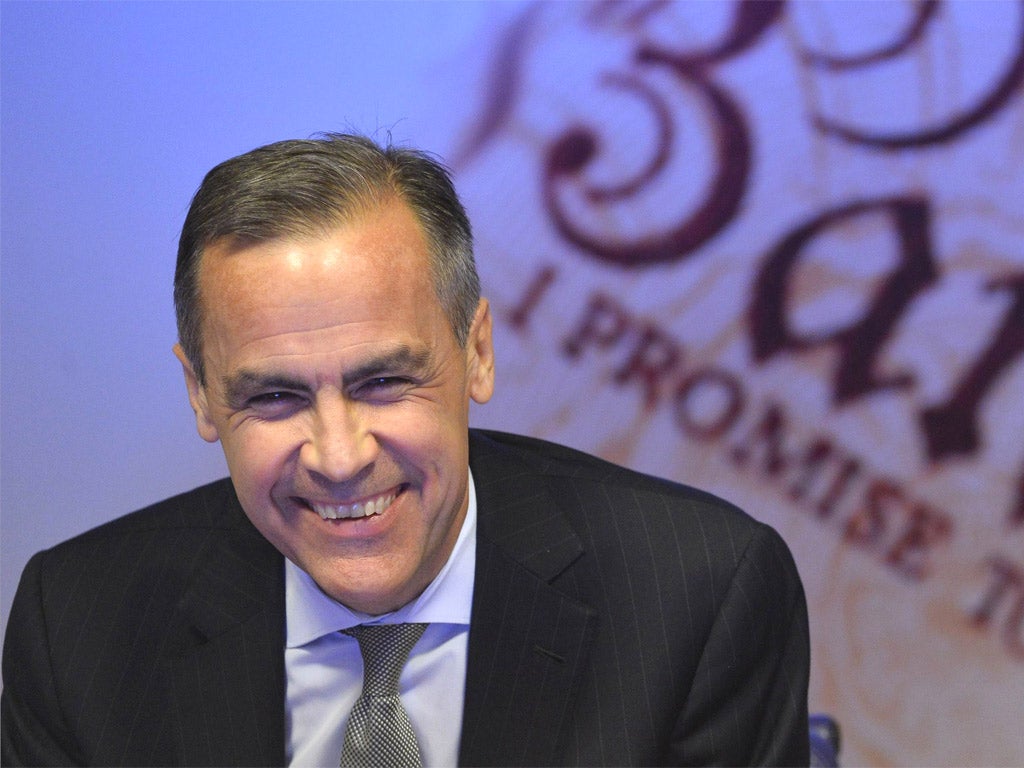Governor Mark Carney declares recovery is here, but will interest rates rise?
The latest economic forecasts looked, on the surface, like good news

More growth, lower inflation, unemployment coming down quicker – the latest economic forecasts from the Bank of England released today looked, on the surface, like unmitigated good news.
But there was also a sting in the tail: the possibility that interest rates could go up far sooner than the Bank had previously led the British public to expect.
“For the first time in a long time you don’t have to be an optimist to see the glass as half full,” the Governor, Mark Carney, told a press conference at the Bank’s Threadneedle Street headquarters today, adding: “The recovery has finally taken hold.”
The Bank upgraded its central growth forecast for this year to 1.6 per cent, up from the 1.4 per cent it pencilled in three months ago. It sees growth in 2014 coming in at 2.8 per cent, higher than the 2.5 per cent it predicted in August. The inflation forecast was also revised down by the Bank, following the surprise dip in Consumer Prices inflation to 2.2 per cent this week.
In August the Bank of England forecast that the unemployment rate would probably fall to 7 per cent in the second half of 2016. today, however, it pulled this forward by a year to the third quarter of 2015.
The Bank also said there is a possibility the 7 per cent rate could be reached as early as the fourth quarter of next year should interest rates remain fixed at their historic lows of 0.5 per cent over the next 12 months.
The scenario of a relatively rapid unemployment fall was supported by official figures today which showed the jobless rate declined to 7.6 per cent in the three months to September, down from 7.8 per cent in the preceding quarter and the lowest rate for three years.
But the potential hazard for the economy lies in that jobless forecast. Under its forward guidance policy, introduced in August, the Bank has pledged not to raise interest rates until the jobless rate comes down at least to 7 per cent. So hitting 7 per cent sooner could, potentially, mean an earlier rise in interest rates. That would, in turn, mean higher repayments on loans and mortgages for many businesses and households.
Mr Carney was keen to dispel this fear today, arguing that it was by no means certain the Bank would lift rates when the unemployment rate hit 7 per cent.
“We will not even begin to think about moving interest rates until that [7 per cent] threshold is achieved and when it is achieved it will be a question of how much momentum the economy has and its ability to withstand an adjustment in monetary policy,” he said.
But that could be an increasingly difficult message to transmit to the public. A survey by the data provider Markit today showed that nearly half of households expect interest rates to go up within a year. When the same question was asked in August, this was just one in three.
Given today’s radical revisions to the jobless forecast and the vagueness of the implications for interest rates, the Governor was asked whether forward guidance has any real power to influence expectations any longer.
In response Mr Carney insisted that if the Bank had not introduced guidance, financial markets and the wider public would be anticipating a rise in interest rates right now given the rapidity with which the economy has bounced back since the spring.
“Let’s say we didn’t have forward guidance in August,” he said. “The discussion would be ‘Is the Bank going to raise rates today?’ No one is asking that question today, and rightly so, because that would be foolish, that would put us in a position of taking a recovery which is finally taking hold and basically pulling the rug out from under it.”
According to the Office for National Statistics, employment rose by 177,000 in the three months to September, while the number of jobless fell by 48,000. But Mr Carney emphasised today that many people who are in jobs want to work more hours, indicating there remains plenty of slack in the economy.
THE DAY IN NUMBERS
1.6%: Bank’s growth forecast for this year
2.8%: Bank’s growth forecast for 2014
7.6%: The present jobless rate
Join our commenting forum
Join thought-provoking conversations, follow other Independent readers and see their replies
Comments
Bookmark popover
Removed from bookmarks